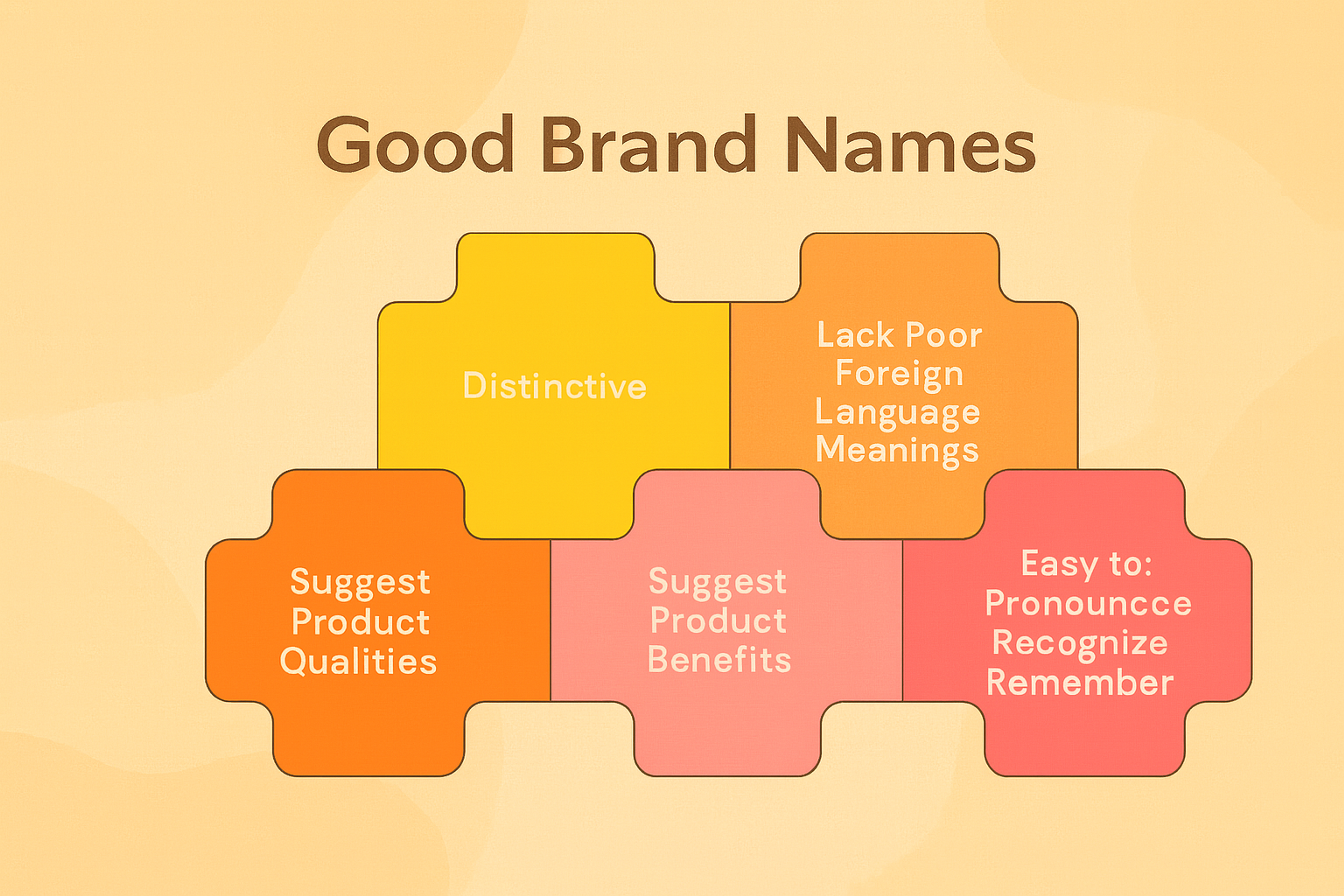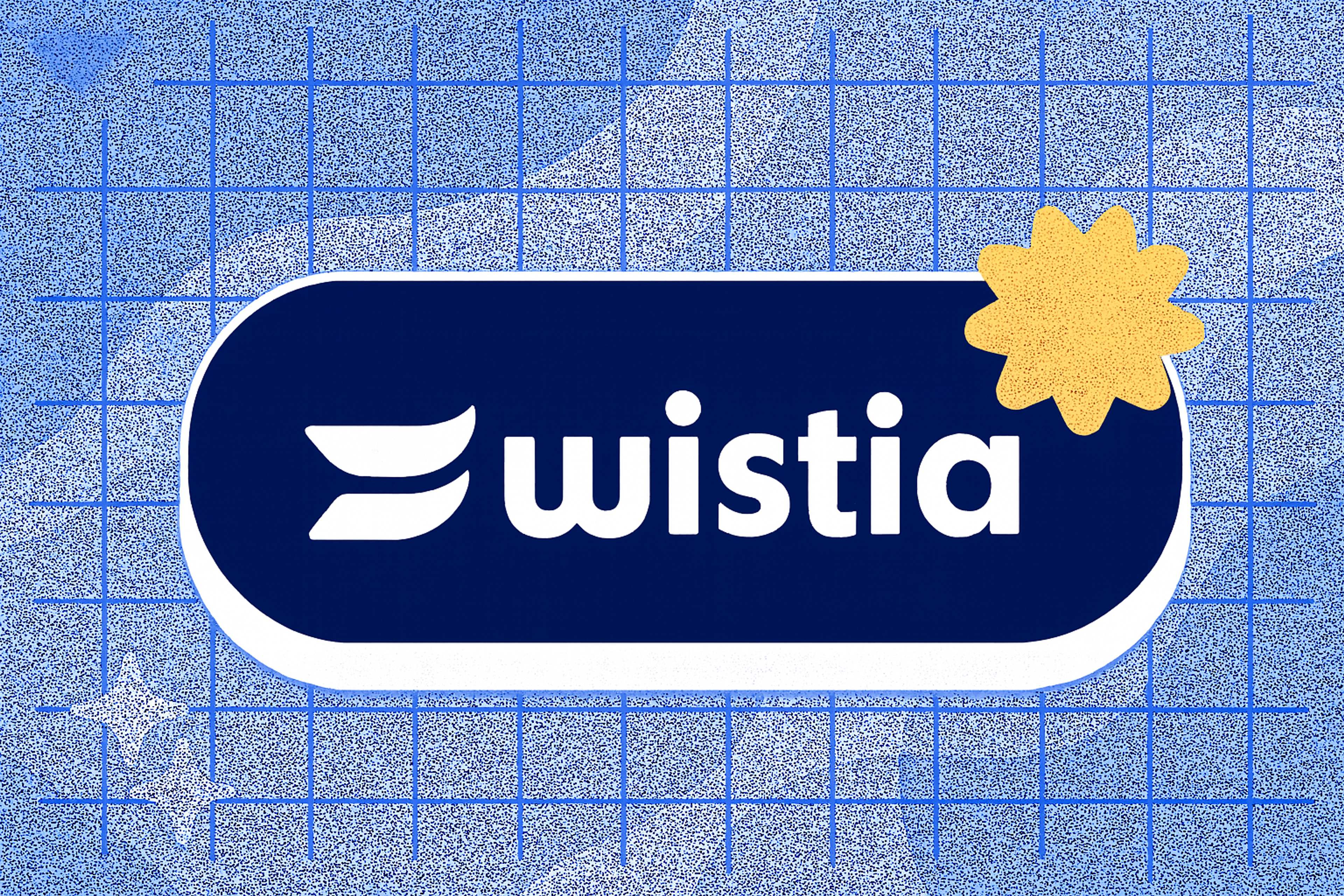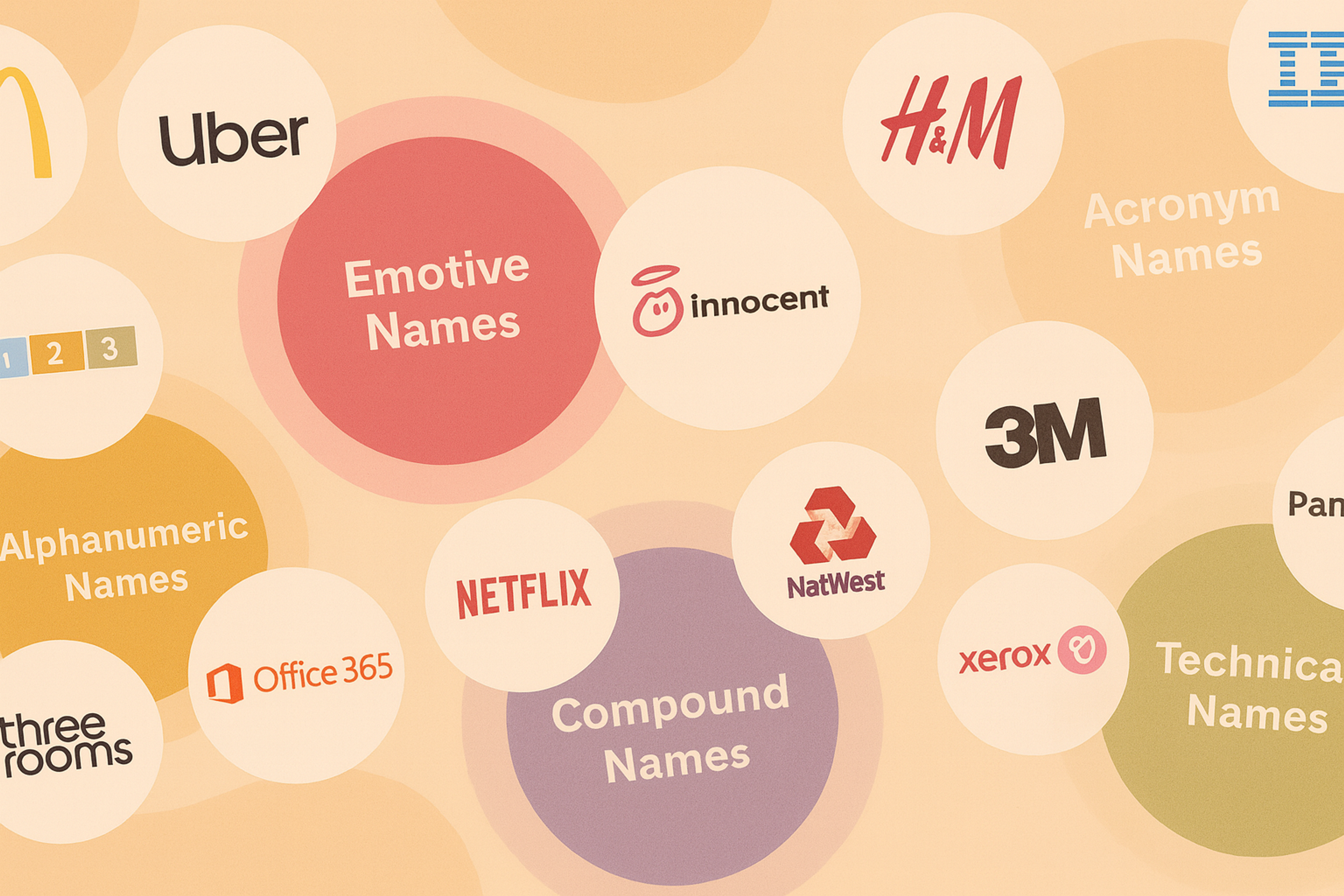A brand name stands out when it is distinctive. This idea deserves real attention. Many guides chase catchy names, but distinctiveness creates value and brand equity.
A brand name helps people recognize you and sets you apart from rivals. It captures what is special about the business. It can deepen your relationship with your audience.
Brand naming is strategic. Define your core identity and clear goals. Make sure the name fits your target audience.
Novelty alone is not enough. Without real distinctiveness, a brand blends into the crowd and gets forgotten.
Let’s focus on what makes a brand name truly distinctive.
Good Brand Names

What Is a Distinctive Brand Name?
A distinct brand name goes beyond being a mere word of identification. It embodies the core of your brand’s message, which is often the first impression a consumer has, serving as your identity and most formidable marketing weapon.
Distinctive will capture people’s attention, resonating emotionally and making them remember or recognize you. Unlike other overly descriptive names, a distinct name arouses interest that sets them apart from different brands, inviting customers to explore what truly sells the brand.
Strategy and creativity do not coexist, but in some cases, they might. Everlane is the best example. It does not describe clothes but suggests clarity, simplicity, and elegance.
The brand name Everlane is fresh and contemporary, which goes hand in hand with the brand’s focus on transparent production and ethical fashion. A distinct brand name is more than a clever marketing strategy — it is both an art and a science, leading to instantaneous recognition and everlasting retention.
What Are the Qualities of a Distinctive Brand Identity?
A distinct brand name’s core trait is originality. It has to be unique and, above everything else, bold. Customers should know that Everlane is separate from the competition, hook them with curiosity, and they are set apart even before they click or walk through the door. A distinctive name does not follow the set guidelines; it cuts through the noise.
- Emotionally Charged: Powerful names stir emotions. Trust, excitement, and curiosity are feelings that strengthen connections with the audience.
- Evocative, Not Literal: You do not need to directly tell customers what you do and spell it out uniquely to capture the brand’s essence, personality, or values.
- Brand Personality: The concept of brand personality is key in shaping customer perception. Imagery, color schemes, typography, and tone of voice all contribute to the overall representation of a brand, helping to connect with the target audience.
- Sticky and Memorable: A great brand name is simple, something that can be easily remembered, spoken, or referred to casually. Consider how terms like “Slack” or “Notion” have transcended their original contexts into broader societal references.
- Rich in Meaning: Inspiring stories give life to the name of a brand. A firm brand name may contain a narrative that aligns with your company’s mission or origins or something as simple as a reference to your core values. Regardless, that name will always carry depth.
- Brand Values: Brand values are crucial for establishing a company's culture and guiding behavior within the workplace. These values influence employee experience, recruitment, and the overall operational principles of the business, grounding a strong brand identity in meaningful values that resonate with the audience.
- Truly One-of-a-Kind: A flurry of imitation means the initial concept has great branding but little meaning. Trendsetters don’t follow, and one-of-a-kind names set the pace. Such a name defies expectations and has a refreshing yet surprising feel.
Why Should a Brand Name Be Distinctive?
A brand name should be distinctive because your business isn’t a duplicate of anyone else’s. They all strive to achieve ambition and originality, which are inevitably captured through strong, unique names. A distinctive brand name adds value by helping you stand out and become unforgettable.
With widespread recognition, your brand can spark deeper emotional resonance. Describing what you do with your firm name is unnecessary, but an urge will surface to provide one. For example, Monzo doesn’t indicate its services as a banking app. But it is bold and sets the tone for modern, user-friendly finance, positioning itself as memorable.
Let’s look at Wistia. It repurposes a familiar word into something modern and technological. That originality becomes part of the brand’s identity and is why consumers remember it.
Wistia

Building a successful brand requires clarity, consistency, and constancy, which fosters customer loyalty and trust.
The beauty of a distinctive name is its staying power. It grows with your brand, adapts as you expand into new offerings, and continues to differentiate you in a crowded market. With the right naming strategy, your brand name becomes more than a label — it becomes a lasting asset.
When to Choose a Distinctive Brand Name
The only reason not to use a distinctive brand name is if your business is a sub-brand purposefully tied to an umbrella brand. Think of an example, such as a logistics subsidiary of an existing business. They probably don't need a bold name for their brand, as their identity is dependent on the parent brand.
Most startups and small businesses do not have the luxury of being part of an established brand. Standing out is important for them. A distinctive name aids in brand recall and helps a business stand out more in the ever-crowded marketplace.
Use a distinctive name to help your target audience build a meaningful emotional connection with your brand. Bluebell is an ice cream brand, and Kinfield is a clean and outdoor skincare brand. Their branding evokes deeper emotions and helps communicate purpose while not being overtly described.
Source: bluebell.com

A distinctive name makes legal work easier. You can secure a trademark with less confusion. It protects your intellectual property by reducing mix-ups with other brands.
A strong name also adds personality. It grabs attention more than flat, generic names. People expect character from brands. A lively name can spark interest and draw audiences in.
A unique name sets you up for long-term success. As you add products or enter new markets, the name can grow with you. It helps you avoid costly rebrands later.
How to Choose a Distinctive Brand Name
Distinctive names require more than basic creativity. Choosing one is a deliberate move that shapes identity and success. Most experts agree your brand must stand out, and so must its name.
Getting there takes exploration, brainstorming, and refinement. Do thorough market research to test options. Make sure the name resonates with your target audience.
Now that you know why distinctiveness matters, we can explore four strategies to help your brand stand out.
Multiple Images of Brand Logos

Dig Deep into Your Brand Identity
Before looking for names, think carefully about what your brand represents. Try to find the essence of your business, not just your products. Reconsider your mission, purpose, values, and vision. Answer these questions:
- What do we believe in?
- What problem are we solving?
- Where are we headed? The answers will shape a name that feels authentic and aligned with your brand’s essence.
Define What Makes You Different
To determine your unique value proposition, you must evaluate what makes you different. What makes you stand out? Whether hyper-personalized service, ethical sourcing, or aggressive product innovation, focus on the gaps in your market competition and use that as guidance when naming. If you are struggling to identify what makes you unique, perform competitor research to discover the whitespace your brand can fill.
Embrace Creative Exploration
Tackle the problem head-on. Use the jargon relevant to your niche or the tone needed to evoke the desired sentiment. Feel free to mix, change, or create entirely new names.
After compiling a privately shared list of potential names, test them visually. Try putting the names next to logo mockups or packaging ideas. While a name might feel weak initially, it gains strength when put in context.
Vet It Thoroughly
Even the most original names need checks. Verify trademarks, domains, and social handles. Make sure no one else is using them. Test for cultural and language risks, especially if you plan to go global. Gather feedback from your team or a focus group. What feels bold to you may feel dull or confusing to others. Finding the right name is hard but essential in a crowded market.
Naming is a smart brand exercise. It blends honest self-reflection with clear strategy and a bit of fun. Stay guided by logic. Done well, the result is a name that sparks imagination and begins your brand story.
How to Create a Distinctive Brand Name: A Naming Process
Every business needs a memorable name. A distinct name grabs attention before the logo appears. Use creativity, but pair it with practical steps.
If your brainstorming stalls, bring in experts. Set stakeholder alignment and expectations at the start. Evocative names may need a story to connect the name and the business.
A Girl Thinking for a Brand Name

Experts can provide strong options, legal checks, and guardrails against mistakes. When your name fits your identity and audience, you are close to the best choice.
Best Examples of a Successful Distinctive Brand Name
Here are three distinctive brand names that showcase bold creativity, strong emotional appeal, and a high fun factor that sets them apart from their rivals.
A good brand name not only reflects the product or service but also contributes to long-term value and competitive differentiation, affecting customer perceptions and business success.
PalmPalm
Industry: protection products
Why it’s distinctive: PalmPalm stands out with its playful repetition and simplicity. The name cleverly references both the human palm and tropical imagery — tying into hygiene and wellness with a warm, memorable feel. It’s catchy, easy to recall, and uniquely positions the brand in a crowded market.
PalmPalm design by Clay
Monzo
Industry: Fintech / Digital Banking
Why it’s distinctive: Monzo has chosen to disregard the staid nomenclature of traditional banks. It also does not resemble other bank names. Instead, it has a vivid modern ring, suggesting energy, innovation, and trust, qualities younger consumers value. Monzo is also easier to trademark. Many tech companies prefer inventing their names to distinguishing marks, enabling them to create a strong identity.
Source: monzo.com

Oura
Industry: Health Tech / Wearables
Why it’s distinctive: Oura (said as 'aura') suggests wellness, calmness, and personal insight — all favorable attributes that bolster the brand's bright ring for sleep and health tracking. These effortless and appealing epithets make the brand a global commodity. Oura also stands for imagination and emotional connection, which give rise to functional human skills. It is easy to remember and unique within the constraints of the tech industry.
Source: tryoura.com

These names are powerful because they describe the product, tell a story, and evoke curiosity. Would you like suggestions for naming a brand or project of your own?
FAQ
What Does “Distinctive” Actually Mean In Naming?
A distinctive name is original, ownable, and hard to confuse with competitors. It sparks interest, is easy to remember, and can be legally protected.
Why Not Just Use A Descriptive Name?
Descriptive names blend in and are harder to trademark. Distinctive names stand out, are easier to protect, and drive branded search and recall.
How Do I Test Distinctiveness Fast?
Map competitor names, Google your top options, run a quick trademark knockout, check social handles/domains, and do a “phone test” to see if people can spell it after hearing it once.
Read more:
Conclusion
Most companies sometimes ponder why distinctiveness matters in a brand name. The reason is that a name is not just a word. It is an identity and the foundation of everything related to the company.
It is the one thing that leaves the first impression and shapes the perception of the value, personality, and credibility the target audience is looking for. With a memorable name, customers won’t easily forget you, helping you stand out easily in a crowded market and making brand recall and trust easy.
In addition to providing marketing benefits, a distinct brand name can offer not just a product but a complete brand experience that resonates with consumers. It minimizes the likelihood of trademark disputes and guarantees that the company will own its name in all digital forms, such as domains and social media accounts.
Eventually, a strong and distinctive name becomes a brand asset as it fosters brand loyalty and enhances brand recognition while elevating the company’s reputation as it grows and expands.


About Clay
Clay is a UI/UX design & branding agency in San Francisco. We team up with startups and leading brands to create transformative digital experience. Clients: Facebook, Slack, Google, Amazon, Credit Karma, Zenefits, etc.
Learn more

About Clay
Clay is a UI/UX design & branding agency in San Francisco. We team up with startups and leading brands to create transformative digital experience. Clients: Facebook, Slack, Google, Amazon, Credit Karma, Zenefits, etc.
Learn more


